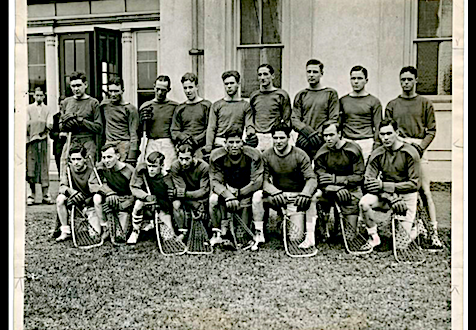You are a fan and wonder “Will Lacrosse be in the Olympics?”. The answer is yes. Lacrosse is set to make its return to the Summer Games in 2028. This announcement was made by the International Olympic Committee (IOC) in 2018, and since then, lacrosse enthusiasts have been eagerly awaiting the sport’s return to the global stage.
While lacrosse has a rich history and is played by millions of people worldwide, it has never been a permanent fixture in the Olympics. However, with its inclusion in the 2028 Games, lacrosse is set to join the likes of basketball, soccer, and swimming as one of the most popular Olympic sports. The inclusion of lacrosse in the Olympics is expected to bring new fans to the sport and help it grow even further.
When Was Lacrosse in the Olympics
Lacrosse has a long history of being played in North America, with Indigenous peoples playing the sport for centuries before it was introduced to Europeans. The sport was first introduced to the Olympics in 1904 in St. Louis, Missouri, where it was played as a demonstration sport. It was then included as a medal sport in the 1908 London Olympics and again in the 1928 Amsterdam Olympics.

History of Lacrosse in the Olympics
In the 1904 St. Louis Olympics, only two teams participated in the lacrosse event: the Canadian team and a team made up of players from the Mohawk Nation. The Canadian team won both matches, but the Mohawk team’s participation marked the first time an Indigenous team competed in the Olympics.
In the 1908 London Olympics, only three teams participated, with Canada once again taking the gold medal. The 1928 Amsterdam Olympics had four teams competing, with the United States winning the gold medal.
Why is Lacrosse not an Olympic Sport Anymore
Lacrosse was removed from the Olympics after the 1928 Amsterdam Olympics. The reason for its removal was due to a lack of international governing bodies and standardization of rules. As the International Olympic Committee (IOC) tightened rules and regulations, lacrosse was removed from the Olympics as it was not governed by an International Federation recognized by the IOC.

Despite lacrosse’s removal from the Olympics, the sport has continued to grow in popularity around the world. In recent years, there have been efforts to reintroduce lacrosse to the Olympics, with the Iroquois Nationals, a team made up of members of the Haudenosaunee Confederacy, fighting for recognition and inclusion in the 2028 Los Angeles Olympics. The World Lacrosse Championship is also being held in San Diego in 2023, with the hope of increasing the sport’s visibility and popularity.
Will Lacrosse Be in the Olympics Again
Lacrosse was played as a full medal sport in the Olympics in 1904 and 1908, but it has not been included in the Olympics since then. There has been a recent push to bring lacrosse back to the Olympics, with the sport being shortlisted for inclusion in the 2028 Olympics in Los Angeles. In this section, we will explore the opportunities and challenges facing lacrosse’s return to the Olympics.
Opportunities
There are several opportunities for lacrosse to be included in the Olympics. Firstly, lacrosse is a fast-paced and exciting sport that is growing in popularity around the world. This makes it an attractive addition to the Olympics, as it would bring in new audiences and increase interest in the games.
Secondly, lacrosse has a strong history and cultural significance, particularly for Indigenous communities in North America. Including lacrosse in the Olympics would recognize and celebrate this history and provide an opportunity for Indigenous athletes to compete on a global stage.
Finally, lacrosse has a strong international presence, with teams from around the world competing in international tournaments. This makes it a sport that is accessible and inclusive, which aligns with the values of the Olympic movement.
Challenges
There are also several challenges facing lacrosse’s inclusion in the Olympics. Firstly, there is competition from other sports that are also vying for inclusion, such as squash, karate, and surfing. This means that lacrosse will need to make a strong case for inclusion and demonstrate its value to the Olympic program.
Secondly, there are logistical challenges associated with hosting a lacrosse tournament at the Olympics. Lacrosse requires a large field and specialized equipment, which may be difficult to accommodate at Olympic venues. Additionally, there are concerns about the cost of hosting a lacrosse tournament, as it may require additional resources and infrastructure.
Finally, there are concerns about the governance and administration of lacrosse, particularly at the international level. There have been issues with corruption and mismanagement in the past, which may make it difficult for lacrosse to gain the trust and support of the International Olympic Committee.
In conclusion, while there are opportunities and challenges facing lacrosse’s return to the Olympics, it is clear that there is strong support and enthusiasm for the sport. If lacrosse can address the challenges and make a compelling case for inclusion, it may well find a place in the Olympic program once again.

Should Lacrosse Be in the Olympics
Lacrosse is a sport that has been played for centuries, and it has grown in popularity over the years. Many people believe that lacrosse should be included in the Olympics. Here are some reasons why you might think it should be:
Lacrosse is a Fast-Paced and Exciting Sport
Lacrosse is a high-speed, high-scoring sport that is thrilling to watch. It is a combination of speed, agility, and skill, making it a perfect fit for the Olympics. The game is also physically demanding, requiring strength, endurance, and quick reflexes. It is a sport that is sure to captivate audiences and keep them on the edge of their seats.
Lacrosse has a Rich History and Cultural Significance
Lacrosse has been played for centuries by Indigenous people in North America, where it originated. It has deep cultural significance and is considered a sacred game by many Indigenous communities. Including lacrosse in the Olympics would be a way to recognize and honor this rich history and cultural heritage.
Lacrosse is Growing in Popularity Around the World
Lacrosse is no longer just a sport played in North America. It is growing in popularity around the world, with teams and leagues popping up in Europe, Asia, and Australia. Including lacrosse in the Olympics would help to further promote the sport and expand its reach to a global audience.
Lacrosse was Previously an Olympic Sport
Lacrosse was previously an Olympic sport, having been played in the 1904 and 1908 Olympics. It was then removed from the Olympic program, but many people believe that it is time for it to make a comeback. With the sport’s growing popularity and cultural significance, it seems like the perfect time to bring it back to the Olympics.
So, there are many reasons why lacrosse should be included in the Olympics. It is a fast-paced and exciting sport with a rich history and cultural significance, and it is growing in popularity around the world. With its previous Olympic history, it seems like a natural fit for the Games.
Will Lacrosse Be in the 2024 Olympics?
While lacrosse was a medal sport in the 1904 and 1908 Olympics, it has not been a part of the Olympic program since then. However, there has been a push to bring the sport back to the Olympics in recent years.
In 2018, the International Olympic Committee (IOC) granted provisional recognition to the Federation of International Lacrosse (FIL), which is the sport’s governing body. This was a significant step towards bringing lacrosse back to the Olympics, as it meant that the FIL was eligible to receive funding from the IOC and participate in IOC events.
Since then, the FIL has been working hard to get lacrosse included in the Olympics. The organization submitted a bid for the sport to be included in the 2024 Olympics, but unfortunately, it was not successful. However, the FIL has not given up on its goal of getting lacrosse back in the Olympics.
Will Lacrosse Be in the 2028 Olympics?
There has been a lot of discussion in recent years about whether lacrosse will be included in the 2028 Olympics in Los Angeles. So, will lacrosse be in the Olympics? The answer is yes, it is likely that lacrosse will be included in the 2028 Olympics.
The International Olympic Committee (IOC) has been considering adding lacrosse to the Olympic program for many years. In 2021, lacrosse was shortlisted to be added to the 2028 Olympics in Los Angeles. This is a significant step forward for the sport, and many people are optimistic that lacrosse will finally be included in the Olympic program.
One of the reasons why lacrosse is a strong contender for inclusion in the Olympics is that it is a fast-paced and exciting sport that is growing in popularity around the world. Lacrosse is played by millions of people in countries such as the United States, Canada, Australia, and England, and it has a strong following in other countries as well.
Another reason why lacrosse is a good fit for the Olympics is that it is a sport that has a rich history and culture. Lacrosse was invented by Native Americans, and it has a deep connection to their culture and traditions. Including lacrosse in the Olympics would be a way to honor this history and celebrate the diversity of the sport.
Overall, it seems likely that lacrosse will be included in the 2028 Olympics in Los Angeles. This is great news for lacrosse fans around the world, and it will be exciting to see the sport showcased on the world stage.

Community Opinions
As the Olympic committee considers adding lacrosse to the list of sports for the 2028 Olympics in Los Angeles, the lacrosse community is buzzing with opinions on the matter. Here are a few perspectives you might encounter:
Fans of the Sport
Fans of lacrosse are thrilled at the possibility of seeing their favorite sport on the world stage. Many believe that lacrosse is a fast-paced, exciting game that deserves more attention and recognition. They argue that the Olympics would be the perfect platform to showcase the sport and attract new fans.
Players and Coaches
Lacrosse players and coaches are also excited about the prospect of competing at the Olympics. Many see it as the ultimate goal and a chance to represent their country on a global scale. However, some worry that the inclusion of lacrosse in the Olympics could change the nature of the sport. They fear that rules and regulations may be altered, and the game could become more commercialized.
Indigenous Communities
The Haudenosaunee Confederacy, the Indigenous people who invented lacrosse, have been fighting for recognition and sovereignty in the sport for years. They argue that lacrosse is a sacred game with deep cultural significance and that their participation in the Olympics would be a step towards reclaiming their identity and heritage. However, they also worry that the commercialization of the sport could further erode their sovereignty and cultural traditions.
Critics
Not everyone is convinced that lacrosse belongs in the Olympics. Some critics argue that the sport is not popular enough to merit inclusion and that there are other sports that deserve the spotlight more. Others worry that the addition of lacrosse to the Olympics could dilute the quality of competition, with weaker teams being added to fill quotas.
Overall, the lacrosse community is divided on whether or not the sport should be included in the Olympics. While many are excited about the prospect, others worry about the potential consequences. Only time will tell if lacrosse will make its way onto the Olympic stage.
Conclusion
In conclusion, the future of lacrosse in the Olympics looks promising. With the growing popularity of the sport and the efforts made by the lacrosse community to get it included in the Olympics, there is a good chance that we will see it in the near future.
However, there are still some obstacles that need to be overcome. The International Olympic Committee (IOC) has strict rules and regulations that need to be followed, and lacrosse needs to be governed by an International Federation recognized by the IOC. The Haudenosaunee Confederacy is currently working towards becoming the first Indigenous nation to secure an Olympic berth for lacrosse.
There is also the issue of the number of teams that will be allowed to participate in the Olympics. Lacrosse is not yet as popular as some other sports, and there is a limit to the number of teams that can participate in the Olympics. However, with the growing popularity of the sport, it is possible that this limit may be increased in the future.
Overall, the future of lacrosse in the Olympics looks bright. With the efforts being made by the lacrosse community and the growing popularity of the sport, there is a good chance that we will see it in the Olympics soon. Keep an eye out for updates on the progress being made towards this goal. Will lacrosse be in the Olympics? Only time will tell, but the future certainly looks promising.















